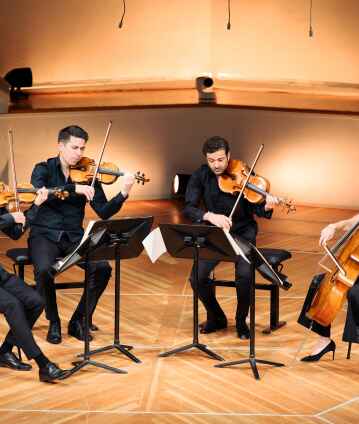Philharmonic chamber music: String quartets by Schumann and Rihm

The string quartet is chamber music’s ultimate genre. Robert Schumann achieved a master stroke with his op. 41 cycle, from which members of the Berliner Philharmoniker play numbers 1 and 3. Inspired by the quartets of Beethoven and Mendelssohn, Schumann created a poetic musical cosmos entirely of his own. In Wolfgang Rihm’s Fourth String Quartet, the Composer in Residence focuses on contrasts – sometimes abrasive and passionately fierce, sometimes intimate and delicate.
Robert Schumann systematically worked his way through the various genres: after ten years of publishing exclusively solo works for piano, 1840 was his year for lieder. He devoted 1841 to symphonies and other orchestral pieces, and in 1842, it was finally the turn of chamber music – including his three string quartets, op. 41. The Schumanns were living in Leipzig at the time, and so were close to their friend Felix Mendelssohn, to whom the quartets are dedicated. As the triad was composed within a short period of time, it is not surprising that there are similarities between the works. The minor and major quartets, which were written first and last, share the common key of A. Typical of Schumann, they combine an awareness of tradition with formal originality. For example, the introduction to the Third Quartet begins with a descending fifth, which then also becomes the defining interval of the fast main theme. The third movement has the character of a scherzo, but is also designed as a series of variations in which Schumann lends the initially fragmentary theme both lyrical beauty and captivating drama. These works also follow the composer’s maxim that “the silver thread of fancy must always be wound round the chain of rule”.
While Schumann’s interest in the string quartet remained a fruitful episode, it was a constant in the works of Wolfgang Rihm. For the composer, this genre captured the “secret character of art” through its simultaneously intimate yet public nature. Rihm wrote his Fourth String Quartet in the winter of 1980/81 when he was not yet 30 years old. Consisting of a slow movement following on from two fast ones, the work begins with a furious, monophonic passage and fades out in pianissimo at the end. The almost anarchic expressiveness is a central feature of Rihm’s musical language in this creative phase.
© 2025 Berlin Phil Media GmbH
Category
Artists
Our recommendations
- Philharmonic chamber music: “Rêverie française”
- The Berlin Phil Series: “Berlin Phil Brass”
- Philharmonic chamber music: Dream sequences and harlequinades
- Octets by Franz Schubert and Jörg Widmann
- Philharmonic chamber music: Of pilgrims, lovers and child prodigies
- Birthday concert of the 12 Cellists of the Berliner Philharmoniker